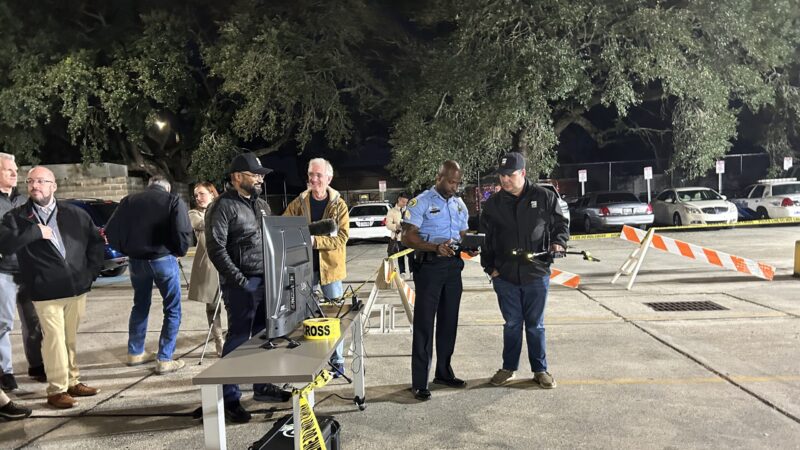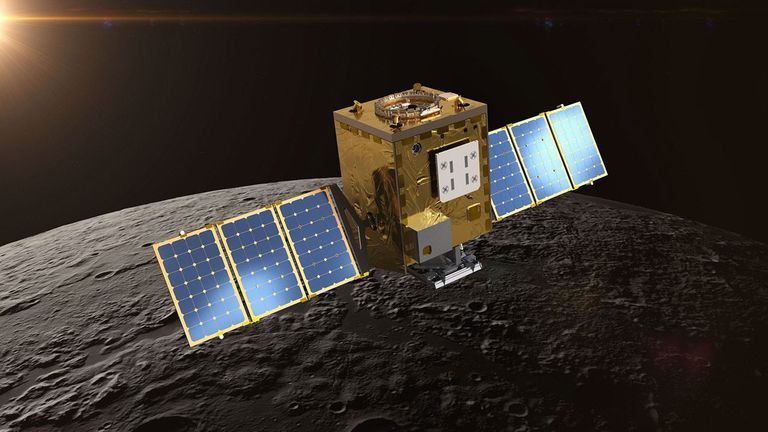New Orleans residents are uneasy about the NOPD’s planned drone program, documents show
New Orleans Police Department officers prepare to fly a drone at a public demonstration on Nov. 28, 2023.
Hundreds of people wrote to weigh in on the New Orleans Police Department’s planned drone program, with many voicing concerns about privacy, law enforcement spending priorities and possible impacts on communities of color, records show.
One commenter said the drone program “smacks of dystopia.” Many called for investment in housing, infrastructure, kids’ programming and other quality-of-life improvements to better address crime in New Orleans.
Gathered in part over the Thanksgiving holiday weekend, more than 250 pages of public comments in opposition provide a window into some residents’ unease about the new program, and show impatience with new surveillance tools.
“I would much prefer the money be spent on public transportation, health care, or even fixing the pothole the size of Texas on my block,” one commenter, Sarah, wrote. The Gulf States Newsroom is not identifying commenters by their full names as they were largely redacted in the documents.
Comments on the drone program and an accompanying draft policy weren’t uniformly negative. Just over 100 additional pages of comments were marked by the department as lauding the initiative. A few dozen more were characterized as “neutral” feedback.
Many positive comments echoed the department’s description of the drones as a “force multiplier” for its work, with respondents pointing to widely reported staffing issues at the NOPD and crime fears, even as the city’s violent crime rates decline.
The program will “help this city as it strives to reduce senseless violence and loss of life while showing the community it cares for its citizens and tourists,” a commenter, Trey, wrote.
In a written statement last week, a police department spokesperson said the agency is still revising related policies in response to the comments it received.
‘Real-time visuals’
New Orleans police rolled out details of the new drone program late last fall, opening draft rules to public comment in late November and holding a demonstration of the tech for media and residents on Nov. 28.
At the event, top NOPD officials stressed a commitment to privacy rights while explaining their plans for the drones. The devices are like “a body-worn camera in the sky” that will “give real-time visuals of scenes so that officers know at that very moment what is going on,” said Deputy Superintendent Jonette Williams.
Officials list traffic investigations, weather events, hazardous material spills and reviewing some crime scenes as potential uses.
A contract, also obtained by Gulf States Newsroom through a records request, suggests a sustained commitment to the New Orleans drone program. Drones were first delivered to the NOPD in “early 2023,” and planned service for them runs through 2026, an agency spokesperson confirmed.
The Crescent City joins other cities and towns in the Gulf South — and across the nation — in its plan to use “small unmanned aircraft systems” as police tools.
A database compiled by the digital civil liberties advocacy group Electronic Frontier Foundation shows that the NOPD will join at least 50 police departments, sheriff’s offices and other first responder agencies in Louisiana, Mississippi and Alabama that have experimented with drone programs.
The police department in Alabama’s most populous city, Huntsville, has an expansive drone program, which started in 2017, that’s used for traffic investigations, drug cases and other uses, according to reports. The department didn’t respond to email and voicemail interview requests regarding its work with drones.
In Jackson, Mississippi, the police department is training pilots to use drones, said public information officer Sam Brown last month. That agency plans to purchase six drones, but officials there did not want to make the buy before having people trained to operate them.
Range of public opinions on use
Public perspectives detailed in the comments show a wide range of stakeholder opinions, many of which describe strong feelings. One man wrote in during his honeymoon to oppose the drones, according to his comment.
Almost all commenters who cheered the drones advocated for the program on public safety grounds. They argued the drones will aid officers and deter crime, as well as assist in more mundane investigations of traffic and garbage-dumping scofflaws.
“[W]e see no greater concern for the use of a drone than that of a helicopter,” the New Orleans Police & Justice Foundation wrote in a statement compiled with the comments.
Commenters in opposition said they feared the drones’ impact on residents of color, with some citing a recent POLITICO report that raised questions about local use of facial recognition in criminal investigations.
Others shared concerns about the drones and wildlife, or referred to New Orleans’ unique culture of public revelry — parades, second lines, Carnival — as vulnerable to aerial surveillance.
NOPD officials previously said they do not expect to fly drones directly over people “at this point,” as a regulatory waiver is required for that use.
“What a horrible panopticon presence that would add to our beloved parade of festivals,” commenter Stan wrote.
Some respondents were angered by the process of soliciting public input, lambasting a public comment period that took place after drones were purchased and officers trained. That perspective is shared by the Eye on Surveillance Coalition, a community advocacy group that has spoken out against the NOPD’s use of drones.
Getting to the point of implementing a program and asking for feedback at that time “does not reflect an investment in or appreciation of the public’s perspective,” said Allie Beth Rose, strategic coordinator for Eye on Surveillance Coalition.
An NOPD spokesperson said it was more “efficient and effective” to ask for feedback on a draft policy, rather than soliciting feedback on rules that hadn’t been written.
The purpose “was to seek thoughtful comments on our intended use of drones rather than ask people to comment on drone usage without any guidelines for what that usage would be,” the spokesperson said.
‘A community issue’
Civil rights experts note a range of issues to watch related to the program.
Civil and human rights attorney Tracie Washington expressed concerns about the wider privacy impacts of police drones flying overhead — perhaps capturing footage of people on Audubon Place or other well-to-do areas of the city.
“When you think in terms of privacy, I want this to be not just an issue about Black and brown people complaining about bad policing. I want it to be a community issue,” Washington, who is affiliated with Southern University Law Center, said.
An NOPD spokesperson said the department is conscious of the need to protect Fourth Amendment rights, which are legal rules about warrants, searches and seizures. Officers “must obtain a search warrant if the drone may intrude upon reasonable expectations of privacy” and they will face discipline if they infringe on rights, they said.
Civil rights commitments by the department come in the wake of reports of drone monitoring by the Louisiana State Police of New Orleans-area protests related to the killing of Minneapolis man George Floyd in June 2020, which stoked controversy locally.
Better batteries, price drops and changing regulations mean law-enforcement drone use is likely to expand, said Jay Stanley, a senior policy analyst and privacy expert who studies new technologies for the national American Civil Liberties Union.
More drones could hum over certain neighborhoods flagged by police, or cause “chilling effects” on protests and public gatherings. That means such programs need strict guidelines and, like other surveillance technologies, shouldn’t be implemented “without the permission” of the community, he explained.
“We just don’t want to find ourselves in a world where police drones seem like they’re always overhead [and] you never know if they’re watching you,” Stanley said. “That’s not what life in America is supposed to be like.”
This story was produced by the Gulf States Newsroom, a collaboration between Mississippi Public Broadcasting, WBHM in Alabama, WWNO and WRKF in Louisiana and NPR.
Deadline looms as Anthropic rejects Pentagon demands it remove AI safeguards
The Defense Department has been feuding with Anthropic over military uses of its artificial intelligence tools. At stake are hundreds of millions of dollars in contracts and access to some of the most advanced AI on the planet.
Hillary Clinton calls House Oversight questioning ‘repetitive’ in 6 hour deposition
In more than seven hours behind closed doors, former Secretary of State Hillary Clinton answered questions from the House Oversight Committee as it investigates Jeffrey Epstein.
Chicagoans pay respects to Jesse Jackson as cross-country memorial services begin
Memorial services for the Rev. Jesse Jackson Sr. to honor his long civil rights legacy begin in Chicago. Events will also take place in Washington, D.C., and South Carolina, where he was born and began his activism.
In reversal, Warner Bros. jilts Netflix for Paramount
Warner Bros. says Paramount's sweetened bid to buy the whole company is "superior" to an $83 billion deal it struck with Netflix for just its streaming services, studios, and intellectual property.
Trump’s ballroom project can continue for now, court says
A US District Judge denied a preservation group's effort to put a pause on construction
NASA lost a lunar spacecraft one day after launch. A new report details what went wrong
Why did a $72 million mission to study water on the moon fail so soon after launch? A new NASA report has the answer.







